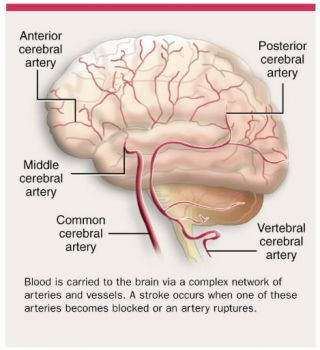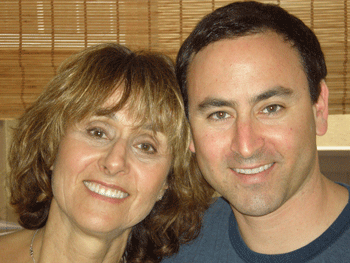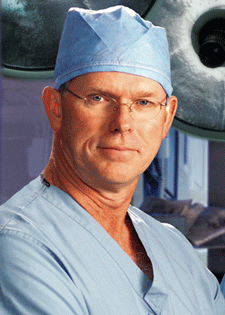“Is Stroke A Risk During Valve Surgery?” Asks Debbie
Written By: Adam Pick, Patient Advocate, Author & Website Founder
Page Last Updated: May 12, 2025
I just received a very, very, very interesting question from Debbie about stroke and heart surgery.
Debbie writes, “Adam – My mom is having open heart surgery next week due to severe regurgitation from a mitral valve prolapse. I have heard that stroke is a risk for patients during cardiac surgery. Is that true?”

Diagram Explaining A Stroke
So you know… Debbie’s question brings back a distinct and touching memory for me as I prepared for my own heart valve surgery.
It was December 20, 2005, the day before my aortic and pulmonary valve replacement surgery. I was at USC Medical Center in Los Angeles, California. My pre-operative tests were almost complete when it came time to discuss the surgical consent form.
Dr. Lee, the surgical resident, sat me down to explain all the risk factors associated with heart surgery. My palms began to sweat and my heart began to race as Dr. Lee reviewed each risk one-by-one.
My mother, Donna, was with me at the hospital that day. I don’t know how, but she could sense the fear-and-anxiety growing in me as Dr. Lee continued down the list. To comfort me, she put her arms around my shoulders and hugged me lovingly. Needless to say, it was an epic moment for a mother-and-son to share.

Me And My Mom (Donna Pick)
Then… Being the optimist that I am… I pushed the fear-and-anxiety aside. I remembered all the research and due diligence which supported a confident selection of my surgical procedure and my surgeon, Doctor Vaughn Starnes. My life, my future, my heart would be in his hands. I signed the consent form knowing that I had found one of the most qualified surgeons for the job. Doctor Starnes would fix me.
Now, back to Debbie’s question… (Sorry for the trip down memory lane.)
Yes, stroke is one of the risks that Dr. Lee discussed with me. According to the Mayo Clinic, “There are two main causes of stroke. An ischemic stroke is caused by a blocked artery in the brain. A hemorrhagic stroke is caused by leaking or bursting of a blood vessel in the brain. Some people may have only a temporary disruption of blood flow to the brain, known as a transient ischemic attack (TIA). A TIA doesn’t cause lasting symptoms.”
Reports suggest, “A major concern with cardiac surgery is the incidence of neurological damage. Stroke occurs in 2-3% of all people undergoing cardiac surgery and is higher in patients at risk for stroke.” So you know, stroke can occur during or after heart surgery.
When I think about that statistical risk, I don’t perceive it as overwhelmingly significant. Yes, stroke does occur for some cardiac surgery patients. But, as we have previously discussed, there is risk in almost everything we do, every day of our lives – driving our cars, walking across the street, even eating peanut butter these days. Come to think of it… Life is, to some extent, a risky situation.

However, risk can be mitigated. That is why I am such an advocate of extensive surgeon research prior to heart surgery. Patients need to be 100% confident in their surgeons and their medical team. I’ll never forget what Dr. Lee, the surgical resident, said to me about stroke. He said, “Stroke is a possibility, but luckily, you found Dr. Starnes. He is one of the best out there. If anyone can prevent a stroke from happening, it’s Dr. Starnes.”
Related Links :
- Stroke Risk Reduction for Heart Valve and Atrial Fibrillation Patients
- Stroke Risk & TAVR: What Should Patients Know?
- Surgeon Q&A: Stroke Risk and Heart Valve Calcification
I hope that helps explain a little more about the risks of stroke and cardiac surgery.
Keep on tickin!
Adam
|
Ross Parrott says on February 18th, 2009 at 5:00 pm |
|
Adam, as I understand it, heart surgically induced stroke comes in several forms: Briefly, These are all relatively simple things but their successful application is still dependant upon the training, experience and skill of the surgeon. I am neither qualified nor licenced. My knowlerdge has been obtained through personal research. My effort to understand these things has been motivated by my own suspected surgically induced stroke. kind regards |
 |
|
Adam Pick says on February 18th, 2009 at 6:44 pm |
|
Hi Ross, Thanks for providing all of the extra insight specific to heart surgery and stroke! Great points! I’m curious… You write that you think you experienced stroke during surgery. What specifically makes you feel that way (symptoms, etc.)? Again, thanks for your help!!! Adam |
 |
|
Vernon Young says on February 18th, 2009 at 7:17 pm |
|
Adam, when I had my surgery at the end of July 2008, I had previously suffered a minor stroke and this was a concern of my Surgeon. During my surgery, I understand that Heparin was introduced into my bloodstream while I was on the heart lung machine. And then, of course, it was continued after surgery during my recuperation and eventually I was placed on Coumadin because an artificial valve was inserted. I have to take Coumadin (Warfarin) for the remainder of my life. This reduces the risk of stroke and bloodclots. The young lady’s concern should be answered by the Surgeon. He can tell her how he will approach this problem to protect her mother. |
 |
|
Ross Parrott says on February 18th, 2009 at 8:45 pm |
|
Testing for stroke I suspect that I suffered a surgically induced stroke came from the behaviour of the Cardiologist and the Surgeon whilst I was in recovery. Besides I had the known effects of the Anaesthetic and Pump Head. I still forget words. My operation was on 1st December and my 3 months recovery is is not complete for about 2 weeks. Forgotten words happens to most people and gets worse as they age, I am 63. I think my lost words symptom is worse than it was before the operation but I have no quantifiable proof. At worst, any stroke I have had is mild. Although I hate being less articulate my main worry is the risk of further stroke events, I would also like do whatever I can to minimise such risk. I would like to point out that plaque caused strokes are in the same family as heart artery blockages (corrected with stents or bypasses). People who have had stents or bypasses need reduce stroke risk. (cholesterol, blood pressure, exercise, stress etc.) The basic test they conducted was to have me squeeze their fingers, to note my strength and to compare my left and right hand. This was done when I was in recovery and even though I am naturally left handed my left hand was weaker than the right. I was also halucinating and apparently behaving strangely (reported by the nurses)?? Next the cardioligist came in and said that I seem to have suffered some kind of event and it seems to have come from one of the carotid arteries. He said that he had booked me in for a MRI (Magnetic Resonance Imaging). Later the speech pathologist came in and just talked with me. The next day however the Sugeon came in when I was cleaning my teeth with my left hand, he seemed very pleased and called in the nurse to see. The following day the Speech Pathologist tested me again and I was able to look at a stick diagram and draw it from memory. Finally the Stroke Specialist came in for a vist and we talked for approximately one minute. No one actually actually stated that they thought I had sufferred a stroke or were even looking for it. My GP was never advised what had happened. After returning home I had a few head aches and returned to the Hospital emergency department and they took a blood sample to look for any of the stroke markers. I have managed to collect the Xray, MRI images and a few reports. I have made an appointment with the stroke surgeon (23/2). I hope to find out: kind regards |
 |
|
JOSEPH says on October 13th, 2010 at 5:19 pm |
|
ADAM…AS A CANDIDATE FOR VALVE REPLACEMENT WIHIN THE NEXT 5 MONTHS WHAT STEPS ARE CURRENTLY BEING TAKEN TO MINIMIZE EXCESSIVE BLEEDING AND STROKE??? AND IS THE RESEARCH AND DEVELOPMENT SITUATION ONE OF IMPROVEMENT IN THESE CRITICAL AREAS SINCE THE INITIAL TEST OF THE TRANSCATHETER SAPIEN AND OTHERS. THANKS |
 |
|
marina says on July 26th, 2011 at 12:57 am |
|
Hello please need help, I had a stroke 5 months ago and I dont have cholesterol, high blood pressure or diabetes. I have a hole in my heart and mitral valve prolapse still waiting to talk to a surgeon but I am so scared about having strokes during surgery, I am on blood thinners for now please someone help me can I get a stroke during sirgery? |
 |











